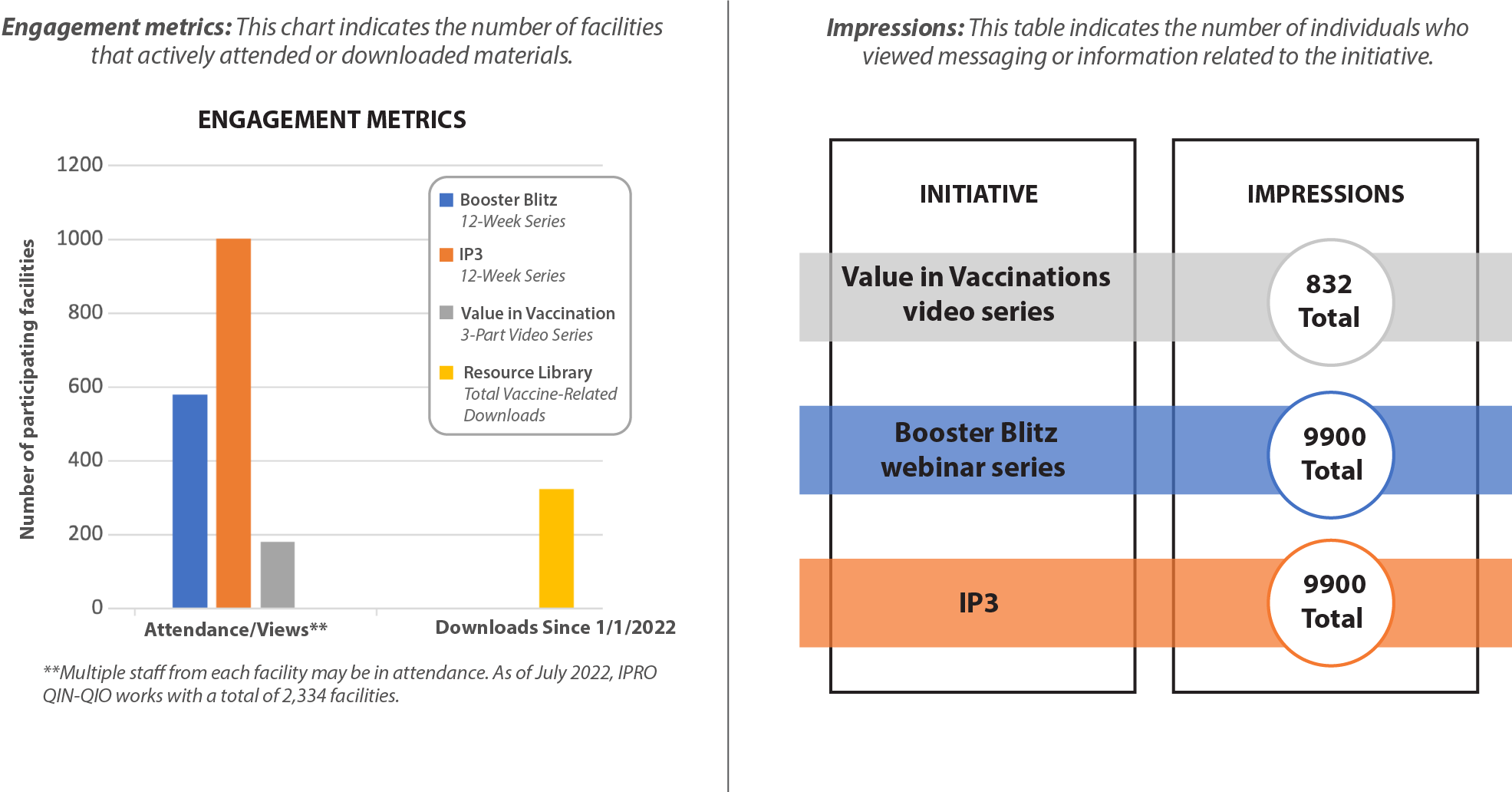In January 2022, the Centers for Medicare & Medicaid Services leveraged the expertise of Quality Innovation Network-Quality Improvement Organizations (QIN-QIOs) to increase nursing home resident COVID-19 vaccinations and boosters. IPRO QIN-QIO provided the nursing homes in its region with access to just-in-time education, training and resources to help them mount an effective defense against the new wave of COVID-19 cases driven by the Omicron variant. IPRO QIN-QIO’s efforts focused on increasing both staff and resident uptake of COVID-19 vaccinations and boosters through a robust outreach strategy, including an interactive Booster Blitz webinar series that reached nearly 10,000 nursing home staff weekly.
Designing an Outreach Strategy and Booster Blitz Interactive Webinar Series
As part of a comprehensive strategy for increasing vaccination and booster rates, IPRO QIN-QIO’s multipronged approach included the Booster Blitz educational series, archived video content, weekly office hours, and education and training developed in conjunction with several state departments of health. The team used an iterative process to adapt to the evolving needs of providers, resulting in an internal Plan-Do-Study-Act (PDSA) cycle that yielded continuous quality improvement over the course of the outreach campaign.
The main component of IPRO QIN-QIO’s approach was a 13-week, live and interactive Booster Blitz webinar series. Each webinar was limited to 30 minutes to allow nursing home leaders to fit the modules into their busy schedules. Topic areas covered during the series included:
- Staff Personal Protective Equipment Compliance
- COVID-19 Boosters and Health Equity
- Communicating About Boosters to Different Audiences
- COVID-19 Booster Timing and Adverse Drug Events
- Using Data to Maximize Boosters
- Managing Difficult Conversations
- Motivational Interviewing
- Quality Assurance and Performance Improvement Initiatives & Boosters
- Institute for Healthcare Improvement’s Framework for Finding Joy in Work
To accommodate personnel unable to attend the live sessions, IPRO QIN-QIO shared a replay of the previous day’s program hosted live by a quality improvement specialist or infection preventionist.
Infection Prevention Office Hours and Partnerships with State Departments of Health
IPRO QIN-QIO’s approach also included the Infection Prevention for Infection Preventionists by an Infection Preventionist (IP3). Designed using the office-hours model, this open forum offered nursing homes the opportunity to exchange ideas, hear expert guidance on topics selected by attendees, and further discuss concepts introduced in the weekly Booster Blitz sessions.
IPRO QIN-QIO also partnered with state departments of health (DOH) in specific states in their region to provide nursing homes with customized training and tools. These partnerships included monthly programming, dashboard tracking, and benchmarking.
- In New York State, the QIN-QIO partnered to create a monthly webinar series on infection control. Attendance at these events, promoted by the DOH, routinely exceeded 500; one session logged more than 1,000 attendees.
- In New Jersey, the team piloted an automated real-time audit tool for hand hygiene observation. Using REDCap as a data collection instrument, IPRO QIN-QIO generated Tableau dashboards to track trends, set competency benchmarks for future goal setting, compare compliance rates by role, present data graphs at QAPI and flag low performers. To date, more than 450 observations have been entered. The QIN-QIO plans to expand the program to other states within their region.
Video and Online Toolkits
To round out its outreach, IPRO QIN-QIO shared several videos and online toolkits:
- Value in Vaccination video series. This series includes three videos featuring interviews with residents of continuing care, independent living and nursing homes discussing their thoughts around receiving the COVID-19 vaccine.
- Nursing Home Education Day. Content from the virtual educational conference for nursing home leaders is available for viewing and download including “How Reliable is Your Infection Prevention Process,” a brief, nine-minute video toolkit.
- IPRO QIN-QIO Resource Library. IPRO’s public-facing Resource Library contains COVID-19 and infection control resources to meet facility needs with modules based on a variety of topics including, hand hygiene; PPE donning and doffing; environmental cleaning; visitation; and vaccination. Additional associated resources (checklists, competency trackers, action plan templates, pre- and post-test assessments) are also available.
Using PDSA Process to Inform and Improve Engagement Strategies
Throughout their outreach, IPRO QIN-QIO tracked engagement metrics. The QIN-QIO reports that each week of the 13-week series, nearly 10,000 staff had an opportunity to engage with either the Booster Blitz or attend the IP3 series.
Using a PDSA approach to improve engagement, the team analyzed attendance data by day of week and time of day. Finding that the Wednesday at 4:30 pm replay of the Tuesday educational session had consistently low attendance, the time was shifted to 3:30 pm to better accommodate both first- and second-shift schedules. The result was a steady increase in attendance to levels quadruple those seen for the original time slot.
Additionally, a shift in the outreach approach was made based on initially poor uptake of the IP3 Office Hours. Supplementing the weekly Constant Contact emails, the infection prevention nurses who hosts the sessions began sending personalized emails to previous attendees using her Outlook email account. This strategy shift has resulted in a 30 percent increase in attendance at these sessions.
Booster Blitz and IP3 attendees were also asked to share examples of how they implemented strategies they learned. Comments included:
- I’ve learned to change the ways we deliver our message about the vaccine from negative to positive.
- Because of the Booster Blitz we had a booster clinic.
- Because of the Booster Blitz we organized a Boost-a-Thon for Omicron.
- Because of the Booster Blitz we have had several booster clinics and are giving 2nd boosters to staff 50+ today.
- Your Booster Blitz campaign helped me with in-services for the nursing staff.
- We had a week … [where] we did booster clinics every day.
Engagement and Impressions Metrics

Interventions Increase Nursing Home Resident COVID-19 Booster Rates
IPRO QIN-QIO’s outreach and education efforts were part of an overall strategy to improve nursing home resident booster rates that continued beyond the initial Booster Blitz series. All nursing homes in the eleven-state region served by IPRO QIN-QIO, plus the District of Columbia, and referred to the QIN-QIO for assistance between January 9, 2022, and May 29, 2022, saw a 24.1 percent net increase in resident vaccination/booster rates compared to nursing homes in the same region that were not referred to CMS for assistance. In addition, the percentage of fully vaccinated and boosted residents at nursing homes referred to IPRO QIN-QIO for assistance during that time increased by 37 percent, compared to the percentage of fully vaccinated and boosted residents at nursing homes that were not referred to the QIN-QIO, which increased by only 9 percent.
IPRO’s Regional Nursing Home Resident COVID-19 Vaccination/Booster Rates Including Referrals from January 9 through May 29, 2022
The graph compares vaccination rates of CMS-referred facilities (orange) with never-referred facilities (blue) and only includes referrals made between January 9 and May 29, 2022. Never-referred facilities did not meet initial criteria for booster referral because CMS focused on facilities with significantly lower rates.
This material was prepared by The Bizzell Group (Bizzell), the Data Validation and Administrative (DVA) contractor, under contract with the Centers for Medicare & Medicaid Services (CMS), an agency of the U.S. Department of Health and Human Services (HHS). Views expressed in this material do not necessarily reflect the official views or policy of CMS or HHS, and any reference to a specific product or entity herein does not constitute endorsement of that product or entity by CMS or HHS. 12SOW/Bizzell/DVA-1122-07/18/2023

